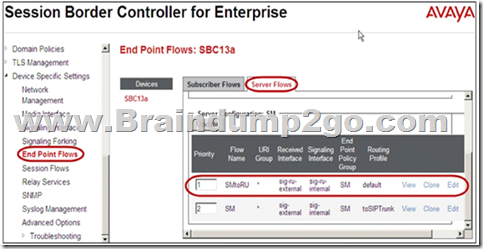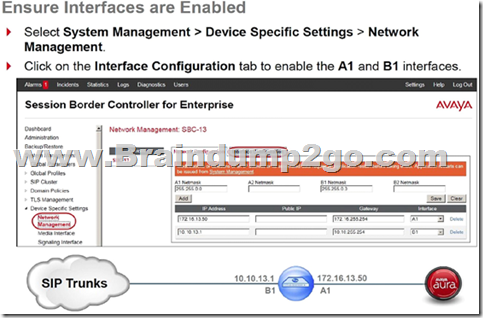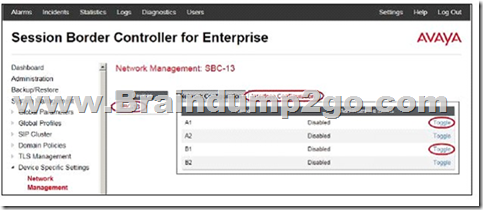 |
 |
 |
 |
 |
|
|---|---|---|---|---|---|
 |
 |
 |
 |
 |
|
| Braindump2go | Testking | Pass4sure | Actualtests | Others | |
| $99.99 | $124.99 | $125.99 | $189 | $29.99/$49.99 | |
| Up-to-Dated | ✔ | ✖ | ✖ | ✖ | ✖ |
| Real Questions | ✔ | ✖ | ✖ | ✖ | ✖ |
| Error Correction | ✔ | ✖ | ✖ | ✖ | ✖ |
| Printable PDF | ✔ | ✖ | ✖ | ✖ | ✖ |
| Premium VCE | ✔ | ✖ | ✖ | ✖ | ✖ |
| VCE Simulator | ✔ | ✖ | ✖ | ✖ | ✖ |
| One Time Purchase | ✔ | ✖ | ✖ | ✖ | ✖ |
| Instant Download | ✔ | ✖ | ✖ | ✖ | ✖ |
| Unlimited Install | ✔ | ✖ | ✖ | ✖ | ✖ |
| 100% Pass Guarantee | ✔ | ✖ | ✖ | ✖ | ✖ |
| 100% Money Back | ✔ | ✖ | ✖ | ✖ | ✖ |
[2018-New-Version]Download Braindump2go 7130X Exam VCE and PDF for Free[34-44]
2018 January New Avaya 7130X Exam Dumps with PDF and VCE Free Updated Today! Following are some new 7130X Exam Questions:
1.|2018 New 7130X Exam Dumps (PDF & VCE) 81Q&As Download:
https://www.braindump2go.com/7130x.html
2.|2018 New 7130X Exam Questions & Answers Download:
https://drive.google.com/drive/folders/1QKSYaZKWPo9ZwbC-rRmP2guGYKDIX-iO?usp=sharing
QUESTION 34
How many Server Flows and/or Subscriber Flows are required for SIP Trunking?
A. one Subscriber Flow and two Server Flows
B. a minimum of two Subscriber Flows
C. one Subscriber Flow and one Server Flow
D. a minimum of two Server Flows
Answer: A
Explanation:
Two types of flows need to be defined for the proper routing of SIP messages from and to the endpoints and the SIP server.
Server Flows – Routing destination sent by SIP server (Session Manager).
Subscriber Flows – Routing destination sent by SIP endpoints.
Example, Server Flows:

QUESTION 35
By default, which Codec does Avaya Aura® Messaging (AAM) support?
A. G.726
B. G.722
C. G.711
D. G.729
Answer: C
Explanation:
You must configure the Messaging system to use the G.711 encoding format.
Note: The G.711 format provides the highest audio quality especially when voice networks use multiple encodings and decodings. Avaya requires that you use the G.711 encoding format in Messaging systems that support TTY devices.
The G.711 encoding format uses a higher encoding rate than GSM. The G.711 encoding format therefore produces larger files and requires more storage space for messages.
Messaging provides customers with adequate storage space for message playback and networking.
https://downloads.avaya.com/css/P8/documents/100172127
QUESTION 36
Which access control method is used by the Avaya Aura® Application Enablement Services (AES) server for administrators?
A. Single Administrator simple password login
B. Challenge-Response shared-key method only
C. System Manager AES Management Menu
D. Role-Based Access Control
Answer: D
Explanation:
Role Based Access Control (RBAC)
Access to AE Services Management Console Web pages can be restricted by user authorization level.
The operations that users are allowed to perform such as read, edit and delete can also be restricted.
https://downloads.avaya.com/css/P8/documents/101014052
QUESTION 37
What is the process for Web browsing to the AES Management Console, and logging in with the default account and default password?
A. https://<AES Management IP Addr>:8443, then enter login=craft password=crftpw
B. https://<AES Management IP Addr> then enter login=admin password=admin01
C. http://<AES Management IP Addr> then enter login=admin password=admin
D. https://<AES Management IP Addr> then enter login=cust password-custpw
Answer: D
Explanation:
Log in to the AE Server as the default administrator (cust).
Make sure that the URL begins with “https://” and the host name or IP address of the AE Services Server is correct.
https://downloads.avaya.com/css/P8/documents/100171737
QUESTION 38
In Avaya Aura® Communication Manager (CM) for TSAPI, which type of CTI-link needs to be configured?
A. ASAI-IP
B. TSAPI-IP
C. ADJ-IP
D. DMCC-IP
Answer: C
Explanation:
The Avaya AES server forwards CTI requests, responses, and events between Invision CTI Server and Communication Manager. The Avaya AES server communicates with Communication Manager over an AES link. Within the AES link, CTI links may be configured to provide CTI services to CTI applications such as Invision CTI.
Step 1: Enter the display system-parameters customer-options command. On Page 3, verify that Computer Telephony Adjunct Links is set to y.
Step 2: Enter the add cti-link m command, where m is a number between 1 and 64, inclusive.
Enter a valid Extension under the provisioned dial plan in Avaya Communication Manager, set the Type field to ADJ-IP, and assign a descriptive Name to the CTI link.
Etc.
https://www.devconnectprogram.com/fileMedia/download/edd26666-ae98-4f15-9a2a-a156d0807160
QUESTION 39
Which four kinds of services does the TSAPI standard provide for third-party call control over Avaya Aura® Communication Manager (CM)? (Choose four.)
A. receiving notifications of events
B. controlling specific calls or stations
C. invoking CM features
D. performing a remote reboot to the CM server
E. completing the routing of incoming calls
F. adding new feature buttons to agent sets
Answer: ABCE
Explanation:
A: The services in the Event Report group provide a client application with the reports of events that cause a change in the state of a call, a connection, or a device.
B: The services in the call control group enable a telephony client application to control a call or connection on Communication Manager. Typical uses of these services are:
placing calls from a device
controlling a connection for a single call.
C: The services in the query group allow a client to query device features and static attributes of a Communication Manager device.
E: The services in the routing group allow Communication Manager to request and receive routing instructions for a call from a client application.
https://downloads.avaya.com/css/P8/documents/100141354
QUESTION 40
Which configuration must be completed before configuring a TSAPI link on Avaya Aura® Application Enablement Services (AES)?
A. A CTI link must be configured on Avaya Aura® Communication Manager (CM) first.
B. A Switch Connection must be configured on Avaya Aura® Application Enablement Services (AES) first.
C. A signaling-group must be configured on Avaya Aura® Communication Manager (CM) first.
D. A CTI-user must be configured on Avaya Aura® Application Enablement Services (AES) first.
Answer: A
Explanation:
If you are administering the AE Server for TSAPI, JTAPI, DMCC with Call Control, Telephony Web Service, or an AE Services integration (Microsoft or IBM Sametime), you must administer a CTI link from Communication Manager to AE Services.
Follow these steps from a Communication Manager SAT to administer a CTI link type ADJ-IP.
Procedure
1. Type add cti-link <link number>, for example add cti-link 5.
2. Complete the CTI LINK form as follows:
E. In the Extension field, type <station extension>, for example 70001.
F. In the Type field, type ADJ-IP.
G. In the Name field, type <name of AE Server>, for example aeserver1.
https://downloads.avaya.com/css/P8/documents/100171737
QUESTION 41
What are three ways of accessing Avaya Aura® Application Enablement Services (AES) to perform administration? (Choose three.)
A. with an Open X.11 terminal window
B. with web access
C. with remote access using Rlogin
D. with local access using a system console
E. with remote access using SSH
Answer: BDE
Explanation:
B: You can use a Web browser to access the Application Enablement Services Management Console (AE Services Management Console).
DE: Administrators can access the AE Services Linux shell (command prompt) either locally using a system console or remotely using a secure shell (ssh) client.
This access method applies primarily to AE Services Technicians (craft users) who perform specific tasks, such as viewing trace logs, installing patches, and so forth.
https://downloads.avaya.com/css/P8/documents/100171737
QUESTION 42
A company is deploying Avaya Session Border Controller for Enterprise (SBCE) to support SIP trunking.
What is the minimum number of IP-addresses they need to assign to the private and public Network Interface Cards (NICs)?
A. Two addresses are assigned to the private NIC and two addresses are assigned to the public NIC.
B. One address is assigned to the private NIC and one address is assigned to the public NIC.
C. Two addresses are assigned to the private NIC and one address is assigned to the public NIC.
D. One address is assigned to the private NIC and two addresses are assigned to the public NIC.
Answer: B
Explanation:
Example configuration:

QUESTION 43
In Avaya Session Border Controller for Enterprise (SBCE), what is the default state of an Interface?
A. Deployed
B. Enabled
C. Disabled
D. Active
Answer: C
Explanation:
Example:
Commission the SBC–SBC Configuration
1. The A1 and B1 interfaces display on the Network Configuration tab.
2. Click on the Interface Configuration tab:

3. Click the Toggle link for both the A1 and the B1 interfaces.
The Administrative Status for both A1 and B1 changes to Enabled:
QUESTION 44
To set Timers, URI Manipulation, and Header Manipulation that the Avaya Session Border Controller for Enterprise (SBCE) will use when signaling to the far-end server; a profile like “avaya-ru” is provided by default.
When configuring the Server Configuration, you must link to which type of Global profile?
A. Signaling
B. Routing
C. Topology Hiding
D. Server Interworking
Answer: D
Explanation:
The standard Avaya profile “avaya-ru” is cloned for the Call Server Interworking Profile.
The Interworking function of the Global Profiles feature enables the SBCE to function in an enterprise VoIP network using different SIP protocols.
!!!RECOMMEND!!!
1.|2018 New 7130X Exam Dumps (PDF & VCE) 81Q&As Download:
https://www.braindump2go.com/7130x.html
2.|2018 New 7130X Study Guide Video:
https://youtu.be/cG3gK8D0uNU
![[New-Version]Valid Braindump2go 7220X VCE Brain Dumps 75Q Offer[Q32-Q42]](https://www.examsforalls.com/wp-content/themes/ribbon-lite/images/nothumb-related.png)